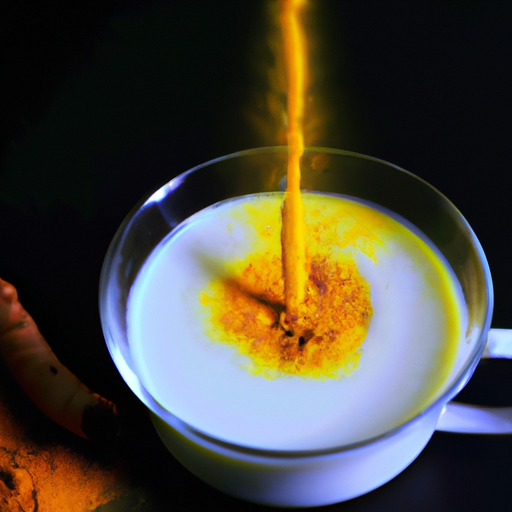Being someone who is always searching for natural remedies to enhance my health, I was fascinated by the excitement surrounding the blend of milk and turmeric.
I was curious about the potential health benefits of this golden elixir and whether or not it was just a passing trend.
Milk and turmeric have been used for centuries in traditional Ayurvedic medicine to treat a variety of ailments.
Turmeric, a spice that gives curry its yellow color, contains an active compound called curcumin that has powerful anti-inflammatory and antioxidant properties.
Milk, on the other hand, is a rich source of calcium and protein, making it an important part of a balanced diet.
Together, these two ingredients have the potential to provide a range of health benefits that I wanted to explore further.
Key Takeaways
- Milk and turmeric have been used in Ayurvedic medicine for centuries due to their potential health benefits.
- Turmeric contains curcumin, which has anti-inflammatory and antioxidant properties, while milk is a rich source of calcium, protein, vitamin D, vitamin B12, and potassium.
- The combination of milk and turmeric can provide anti-inflammatory properties, improve digestion, support a healthy gut microbiome, and boost the immune system.
- Dairy alternatives such as almond, coconut, and soy milk are great options for those with allergies or intolerances to milk, and turmeric can be added to various dishes for flavor and health benefits. However, it’s important to be mindful of potential interactions with medications.
The Health Benefits of Milk
You’re going to love how drinking milk can boost your overall health and well-being! Milk is a great source of calcium, which is essential for strong bones and teeth. Calcium also helps with muscle function, nerve transmission, and blood clotting.
Moreover, milk contains other essential nutrients such as vitamin D, vitamin B12, and potassium that help promote optimal health. Despite its benefits, some people may avoid drinking milk due to lactose intolerance, which is the inability to digest lactose, a sugar found in milk and dairy products.
However, lactose-free milk is available, and there are also lactase supplements that can aid in lactose digestion. Therefore, even if you’re lactose intolerant, you can still enjoy the health benefits of milk.
Now let’s talk about the health benefits of turmeric.
The Health Benefits of Turmeric
Curcumin, the active compound found in turmeric, has been extensively studied for its potential health benefits. Its anti-inflammatory properties have been shown to help reduce the risk of chronic diseases such as heart disease, cancer, and Alzheimer’s disease. Turmeric supplements have become increasingly popular as a natural way to support overall health and well-being.
In addition to its use in supplements, turmeric is a common spice used in cooking. It can be added to soups, stews, and curries to enhance flavor and provide potential health benefits. However, it is important to note that the concentration of curcumin in turmeric used for cooking is relatively low compared to that found in supplements. Therefore, consuming turmeric in supplement form may provide a more concentrated and consistent dose of curcumin.
When it comes to health benefits, combining milk and turmeric has been shown to have potential advantages.
The Benefits of Combining Milk and Turmeric
Combining turmeric and milk can provide potential health advantages beyond just the benefits of curcumin. One popular way to consume this delicious combination is through a turmeric latte, which is a warm and comforting beverage made with milk, turmeric, and other spices. Here are three reasons why this drink is worth adding to your diet:
-
It may reduce inflammation: Both turmeric and milk have anti-inflammatory properties, which can help to reduce inflammation in the body. This is particularly beneficial for those with conditions such as arthritis, as well as athletes who experience muscle soreness after workouts.
-
It may improve digestion: Turmeric has been shown to help improve digestion by increasing the production of bile in the liver. Milk also contains probiotics, which can help to support a healthy gut microbiome.
-
It may boost immunity: Turmeric has been shown to have immune-boosting properties, and milk is a good source of vitamin D and calcium, both of which are important for a healthy immune system.
If you’re interested in trying out milk and turmeric recipes, a turmeric latte is a great place to start. However, there are many other ways to incorporate these two ingredients into your diet, such as adding turmeric to smoothies or using it as a seasoning for roasted vegetables.
In the next section, we’ll explore how to consume milk and turmeric in more detail.
How to Consume Milk and Turmeric
If you’re looking to spice up your meals and add some extra nutrition, there are plenty of creative ways to incorporate turmeric and milk into your diet. One way to consume milk and turmeric is by making turmeric milk, also known as golden milk.
To make this drink, simply combine milk, turmeric, ginger, cinnamon, and honey in a small saucepan and heat until warm. You can also experiment with other turmeric recipes, such as adding the spice to smoothies, soups, or even scrambled eggs.
However, if you’re lactose intolerant or simply prefer milk alternatives, there are plenty of options available. Almond, coconut, and soy milk are all great alternatives to dairy milk and can be used in turmeric recipes just as easily.
Be sure to check the ingredient list for added sugars and other additives, and choose unsweetened varieties whenever possible. With a little creativity and experimentation, you can easily incorporate the benefits of milk and turmeric into your diet in a way that works for you.
As with any new addition to your diet, it’s important to be aware of any precautions and potential side effects. While turmeric is generally considered safe for most people, it can interact with certain medications and may cause digestive issues in some individuals.
If you experience any discomfort or adverse effects after consuming milk and turmeric, it’s best to consult with a healthcare professional.
Precautions and Potential Side Effects
As someone who may be interested in incorporating milk and turmeric into your diet, it’s important to be aware of potential precautions and side effects.
Allergies and intolerances to milk or turmeric can be a concern for some individuals, while interactions with certain medications can also pose a risk.
Additionally, there are safe consumption guidelines to follow to ensure that you’re reaping the benefits of milk and turmeric without any adverse effects.
Allergies and Intolerances
Unfortunately, some people may experience allergic reactions or intolerances to milk and turmeric, causing discomfort and other symptoms. Food sensitivities occur when the immune system reacts to certain foods as if they were harmful substances.
In the case of milk allergies, the immune system identifies milk proteins as foreign invaders and triggers an allergic reaction. Symptoms can range from mild, such as hives and itching, to severe, such as anaphylaxis, which can be life-threatening.
Similarly, turmeric can trigger allergic reactions or intolerances in some people. The active compound in turmeric, curcumin, can cause digestive issues such as bloating, gas, and diarrhea. It can also interact with certain medications, such as blood thinners and diabetes drugs, making it important for individuals with these conditions to discuss the use of turmeric with their healthcare provider.
As we move on to the next section about interactions with medications, it’s essential to understand how milk and turmeric can impact the effectiveness of certain drugs.
Interactions with Medications
Wow, it’s amazing how certain medications can have unexpected interactions with the foods we eat. Milk and turmeric are no exception.
While milk is generally considered safe and nutritious, it can actually interfere with the absorption of certain medications. For instance, calcium-rich milk can prevent the body from absorbing antibiotics like tetracycline and ciprofloxacin, which can reduce their effectiveness. Additionally, milk may also interact with some blood pressure medications and thyroid hormone replacement therapy, leading to medication contraindications or dosage considerations.
Similarly, turmeric, a spice commonly used in Indian cuisine, has been found to interact with certain medications. Turmeric contains a compound called curcumin, which can inhibit the activity of enzymes responsible for breaking down many drugs in the body. This can lead to an increase in the concentration of these medications, potentially causing adverse effects or toxicity.
Some medications that may interact with turmeric include blood thinners like warfarin, anti-inflammatory drugs like aspirin, and chemotherapy drugs. To ensure safe consumption, it is important to discuss any potential interactions with your healthcare provider and follow their recommended guidelines.
Safe Consumption Guidelines
To safely enjoy your meals and medications, it’s important to follow guidelines provided by your healthcare provider and be mindful of potential interactions between food and drugs. Here are some safe consumption guidelines to keep in mind when consuming milk and turmeric:
-
Turmeric dosage: While turmeric is generally considered safe when used in normal amounts found in food, taking large amounts of turmeric supplements can cause gastrointestinal issues and interact with certain medications. It’s recommended to stick to the dosage instructions provided on supplement labels and consult with your healthcare provider before starting any new supplements.
-
Milk alternatives: If you’re lactose intolerant or prefer to avoid dairy, there are many milk alternatives available such as soy, almond, or oat milk. However, it’s important to check the labels of these products as some may contain added sugars or other ingredients that could interact with medications or health conditions. It’s always best to consult with your healthcare provider or a registered dietitian to determine the best milk alternative for you.
By following these safe consumption guidelines, you can enjoy the health benefits of milk and turmeric without risking any interactions with medications or health conditions. Remember to always consult with your healthcare provider before starting any new supplements or making significant changes to your diet.
Frequently Asked Questions
Can milk and turmeric be used to treat specific medical conditions?
Yes, milk and turmeric have been shown to have anti-inflammatory effects and may be beneficial for conditions such as arthritis. Additionally, the duo can improve skin health by reducing inflammation and promoting collagen production.
Is it safe to consume milk and turmeric during pregnancy?
As a healthcare professional, it’s important to note that consuming milk and turmeric during pregnancy is generally safe in moderate amounts. Turmeric has anti-inflammatory properties and milk provides essential nutrients like calcium and vitamin D. Consult with your healthcare provider for personalized advice.
Can milk and turmeric help with weight loss?
Milk and turmeric can aid in weight loss due to their anti-inflammatory properties. Enjoy a delicious turmeric milk recipe for added benefits. However, a balanced diet and exercise should be the main focus for weight loss.
How often should I consume milk and turmeric for maximum health benefits?
For maximum health benefits, I consume milk and turmeric daily. Studies suggest a dosage of 500-2000mg of turmeric per day. However, it’s important to consult with a healthcare professional before starting any supplement regimen.
Are there any specific types of milk or turmeric that are better for consumption?
Wow, let me tell you, the best milk for cooking with turmeric is coconut milk! It adds a delicious and creamy flavor to any dish. As for turmeric, look for organic and high-quality brands. My favorite recipe is a turmeric latte made with almond milk and honey.
Conclusion
In conclusion, the combination of milk and turmeric is a powerhouse of health benefits. This dynamic duo can reduce inflammation and boost immunity, making it a great addition to your daily routine.
As someone who has incorporated this golden elixir into my daily routine, I can attest to its effectiveness in improving my overall well-being. So why not try it out for yourself?
Whip up a warm cup of turmeric milk before bed or add a sprinkle of turmeric to your morning oatmeal. However, it’s important to note that turmeric can interact with certain medications and excessive consumption may lead to digestive issues. As with any new addition to your diet, it’s recommended to consult with a healthcare professional.
With caution and moderation, milk and turmeric can be a delicious and nutritious addition to your daily routine.










